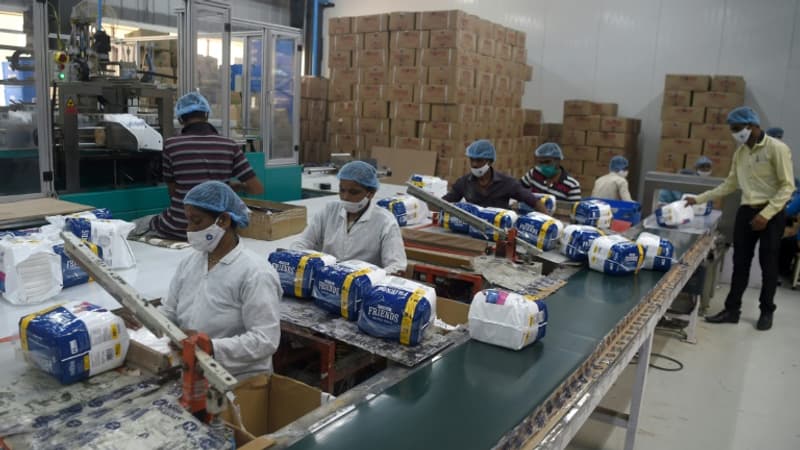Should we expect the European market to be flooded with Indian products? Although the country has been under customs tasks of 50% since August 27, the US market will be mechanically reduced for Indian companies, which, therefore, will have to find new commercial points.
According to the Center for Global Commercial Research Initiative based in New Delhi and cited by AFP, the maintenance of customs tariffs could reduce Indian exports to $ 49.6 billion for the current year (April 2025-April 2026). The AFP also indicates that Indian exports to the United States have remained between April and July, among others thanks to the anticipation of companies that have advanced goods of goods.
Catherine Bros, Economics professor at the University of Tours and specialist in India, tells BFM Business that customs tariffs imposed by the United States in India “must be put into perspective”, because 45% of Indian exports are not subject to 50% and Indian imports in the United States only have 2% of total American imports.
The iPhone produced in India is not affected by these measures, which helps lighten the impact of these customs tasks, abounds Vincent Vicard, even if it is “even too early to make projections.”
However, from a symbolic point of view, this measure is “a terrible camouflet for Narendra Modi and foreign policy,” according to Catherine Bros, the Indian prime minister, until recently showed her, supposedly, a good understanding with the US president.
Bloomberg reveals that Indian companies would also develop strategies to avoid customs duties imposed by Washington, and in particular develop production in the African continent and then export to the United States.
Bloomberg indicates that some countries, such as Ethiopia, Nigeria and Botswana and Morocco offer advantageous conditions to attract foreign investments.
Impossible requests from the United States
If Donald Trump decided to apply this customs price to India, it is due in particular to the supply of India to Russian oil. Therefore, New Delhi buys it in mass already a lower cost and once refined, Russian oil becomes the first product exported by India, which makes it a problem of energy sovereignty, details Catherine Bros.
Another important problem: the agricultural market. The American desire to open the Indian market, especially agricultural, while the sector has 40% of direct and indirect jobs in India, seems to be an unthinkable condition for the Modi government.
Indian protectionism
Instead of flooding other markets, India is looking, above all, to strengthen itself in its domestic market, explains Catherine Bros. “India has been a protectionist for a long time, seeks to protect its internal market. Its growth is carried out more in its domestic market instead of exports, in a logic of less dependence on the global market.”
It is within this framework that the Government is based on the development of “Make In India”, promoting foreign investments that favor technology transfers, licensing and establishment of factories on the site. This is the approach followed, for example, the French aircraft manufacturer Dassault Aviation, in a logic of associations with Indian industrialists, to copenerate production sites for its civil and military planes.
Long -term negotiations between India and the European Union
Last spring relaunched, with the visit of the president of the European Commission Ursula von der Leyen, commercial discussions between India and the European Union are “a long and complex process,” explains Vincent Vicard.
According to an analysis of the Montaigne Institute, the European Union would seek more “a global agreement, while India needs direct foreign investments”, always in the logic of developing its own domestic market instead of massively increasing its volume of exports to compensate for US barriers.
Source: BFM TV


